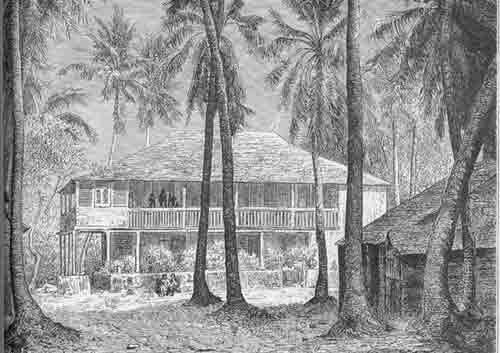|
Université De Port-au-Prince
The University of Port-au-Prince (, UP) is a for-profit private higher education institution located in Port-au-Prince Port-au-Prince ( ; ; , ) is the Capital city, capital and List of cities in Haiti, most populous city of Haiti. The city's population was estimated at 1,200,000 in 2022 with the metropolitan area estimated at a population of 2,618,894. The me ..., Haiti founded on 3 November 1983. Its enrollment is ranged from 1,000 to 1,999 students. UP offers courses and programs leading to officially recognized higher education degrees in several areas of study. Athletics UP won the 2008–09 University Basketball Championship of Haiti. References External linksUniversité de Port-au-Prince(official site) Universities in Haiti Buildings and structures in Port-au-Prince 1983 establishments in Haiti Educational institutions established in 1983 {{Haiti-university-stub ... [...More Info...] [...Related Items...] OR: [Wikipedia] [Google] [Baidu] |
Port-au-Prince
Port-au-Prince ( ; ; , ) is the Capital city, capital and List of cities in Haiti, most populous city of Haiti. The city's population was estimated at 1,200,000 in 2022 with the metropolitan area estimated at a population of 2,618,894. The metropolitan area is defined by the IHSI as including the Communes of Haiti, communes of Port-au-Prince, Delmas, Ouest, Delmas, Cité Soleil, Tabarre, Carrefour, Ouest, Carrefour, and Pétion-Ville. The city of Port-au-Prince is on the Gulf of Gonâve: the bay on which the city lies, which acts as a natural harbor, has sustained economic activity since the civilizations of the Taíno. It was first incorporated under Saint-Domingue, French colonial rule in 1749. The city's layout is similar to that of an amphitheater; commercial districts are near the water, while residential neighborhoods are located on the hills above. Its population is difficult to ascertain due to the rapid growth of slums in the hillsides above the city; however, recent ... [...More Info...] [...Related Items...] OR: [Wikipedia] [Google] [Baidu] |
Haiti
Haiti, officially the Republic of Haiti, is a country on the island of Hispaniola in the Caribbean Sea, east of Cuba and Jamaica, and south of the Bahamas. It occupies the western three-eighths of the island, which it shares with the Dominican Republic. Haiti is the third largest country in the Caribbean, and with an estimated population of 11.4 million, is the most populous Caribbean country. The capital and largest city is Port-au-Prince. Haiti was originally inhabited by the Taíno people. In 1492, Christopher Columbus established the first European settlement in the Americas, La Navidad, on its northeastern coast. The island was part of the Spanish Empire until 1697, when the western portion was Peace of Ryswick, ceded to France and became Saint-Domingue, dominated by sugarcane sugar plantations in the Caribbean, plantations worked by enslaved Africans. The 1791–1804 Haitian Revolution made Haiti the first sovereign state in the Caribbean, the second republic in the Americ ... [...More Info...] [...Related Items...] OR: [Wikipedia] [Google] [Baidu] |
Universities In Haiti
A university () is an institution of tertiary education and research which awards academic degrees in several academic disciplines. ''University'' is derived from the Latin phrase , which roughly means "community of teachers and scholars". Universities typically offer both undergraduate and postgraduate programs. The first universities in Europe were established by Catholic monks. The University of Bologna (), Italy, which was founded in 1088, is the first university in the sense of: *being a high degree-awarding institute. *using the word (which was coined at its foundation). *having independence from the ecclesiastic schools and issuing secular as well as non-secular degrees (with teaching conducted by both clergy and non-clergy): grammar, rhetoric, logic, theology, canon law and notarial law.Hunt Janin: "The university in medieval life, 1179–1499", McFarland, 2008, , p. 55f.de Ridder-Symoens, Hilde''A History of the University in Europe: Volume 1, Universities in the Middl ... [...More Info...] [...Related Items...] OR: [Wikipedia] [Google] [Baidu] |
Buildings And Structures In Port-au-Prince
A building or edifice is an enclosed structure with a roof, walls and windows, usually standing permanently in one place, such as a house or factory. Buildings come in a variety of sizes, shapes, and functions, and have been adapted throughout history for numerous factors, from building materials available, to weather conditions, land prices, ground conditions, specific uses, prestige, and aesthetic reasons. To better understand the concept, see ''Nonbuilding structure'' for contrast. Buildings serve several societal needs – occupancy, primarily as shelter from weather, security, living space, privacy, to store belongings, and to comfortably live and work. A building as a shelter represents a physical separation of the human habitat (a place of comfort and safety) from the ''outside'' (a place that may be harsh and harmful at times). buildings have been objects or canvasses of much artistic expression. In recent years, interest in sustainable planning and building practi ... [...More Info...] [...Related Items...] OR: [Wikipedia] [Google] [Baidu] |
1983 Establishments In Haiti
1983 saw both the official beginning of the Internet and the first mobile cellular telephone call. Events January * January 1 – The migration of the ARPANET to TCP/IP is officially completed (this is considered to be the beginning of the true Internet). * January 6 – Pope John Paul II appoints a bishop over the Czechoslovak exile community, which the ''Rudé právo'' newspaper calls a "provocation." This begins a year-long disagreement between the Czechoslovak Socialist Republic and the Vatican, leading to the eventual restoration of diplomatic relations between the two states. * January 14 – The head of Bangladesh's military dictatorship, Hussain Muhammad Ershad, announces his intentions to "turn Bangladesh into an Islamic state." * January 18 – U.S. Secretary of the Interior James G. Watt makes controversial remarks blaming poor living conditions on Native American reservations on "the failures of socialism." Watt will eventually resign in September after a series o ... [...More Info...] [...Related Items...] OR: [Wikipedia] [Google] [Baidu] |



